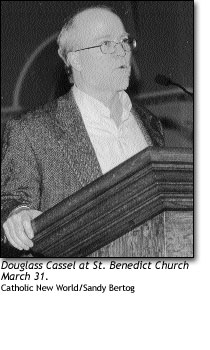 |
 |
|||||
 |
 |
 |
 |
 |
Chicago-area Catholics pray for U.S., Iraqi victims
By Michelle Martin When St. Benedict parishioner Douglass W. Cassel approached the ambo, he read the names, ages and home towns of the first 40 U.S. soldiers killed in the war in Iraq, speaking of the tragedy of so many young people—some still in their teens—who would never come home, and praying for their souls and for their families. Cassel, director of the Center for International Human Rights at Northwestern University Law School, and Detroit Auxiliary Bishop Thomas Gumbleton, spoke about the “The Human Face of the War in Iraq” to a near capacity audience of about 600 at the Irving Park Road church March 31. The event was one of many held throughout the archdiocese in mid-March and early April. Organizers of many services took no position on the war as participants prayed for peace; others, like the talk at St. Benedict, expressed opposition to the conflict. As Cassel read the names of the fallen, audience members bowed their heads and many wiped away tears. Then Cassel spoke of the tragedy most United States residents do not see: the dead and missing Iraqis. “When Iraqis die in the war, we don’t learn their names, we don’t see their photos in the newspaper and we don’t see their families interviewed in their homes,” he said. We don’t even know how many there are.” That’s because neither the U.S.-led coalition forces nor the Iraqi government is interested in keeping a count, or, if they do, sharing that information. The best estimates available were between four and five hundred Iraqi civilians and thousands of Iraqi fighters had died by the end of March. “It took me about four minutes to read the list I read to you,” he said. “To read the names of the Iraqi civilians, if they were available, would take ... two hours.” The early resistance coalition forces met in southern Iraq came as a surprise only because Bush administration officials were arrogant and overconfident, he said. “Before this war began, we were told by the best and the brightest in Washington that this war would turn out to be a cakewalk,” Cassel said. “People would turn out to greet the invading soldiers with hosannas and palm fronds. But one never knows what will happen in a war. It’s something that very easily does not follow the script, does not follow the plan. But when a mistake is made, the suffering can be intolerable.” Bishop Gumbleton displayed pictures of Iraqi children he had taken during a January visit there. “I wonder how many of them have died,” the bishop said. Then, only days after being arrested at a protest outside the White House, he explained why he opposes the war, keying his presentation to Pope John Paul II’s World Day for Peace message, which underlined the continuing relevance of Blessed Pope John XXIII’s 1963 encyclical, “Pacem in Terris” (Peace on Earth). Bishop Gumbleton drew applause from the audience when he said, “It is an immoral decision, not just a political decision. No one has been more forthright, or spoken with a greater sense of urgency, than Pope John Paul II. As he said in March 1991, ‘Never again war. No, never again war.’” The reasons for opposing modern war are threefold, Bishop Gumbleton said. First, modern warfare inevitably kills civilians in much larger numbers than combatants. While only about 5 percent of those who died in World War I were civilians, half of those who died in World War II were not soldiers. More recently, in Vietnam, up to 90 percent of those killed were civilians, and in the wars of the 1990s, more children died than soldiers, he said. “This cannot be morally justified,” he said, talking about people suffering in the southern Iraqi city of Basra, without food or water, and those who have lost their homes to bombing in Baghdad. “This destruction is cruel ... and worse yet, its is premeditated.” The second reason war cannot be justified is the upheaval it causes in the lives of those who do the killing, who must teach themselves to hate, he said. And in the end, war leaves “a trail of hatred and resentment that makes it even more difficult to resolve the issues that provoked the war.” Front Page | Digest | Cardinal | Interview |
||